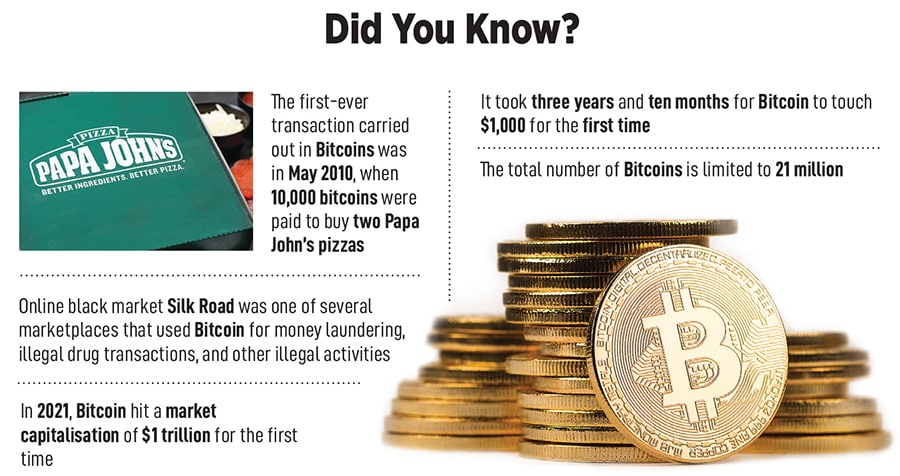Forbes India @15: Bitcoin, 15 years later, digital gold or risky investment?
Bitcoin, the first ever cryptocurrency launched in 2009, and the jury is still divided whether it is digital gold or a risky investment


For some, Bitcoin is a risky bet, and for others, it’s digital gold. While billionaires like Bill Gates and Warren Buffet have been vocal critics, businesspersons Elon Musk and Mark Cuban have backed it. Somewhere in between, the price of the first-ever cryptocurrency has risen from fractions of a penny in 2010 to an all-time high of $73,000 in 2024.
The possibility of upending the existing financial system has sparked interest and controversy. Bitcoin came into being in 2009, amid a global financial crisis, after its purported creator, Satoshi Nakamoto [pseudonym], published a white paper on this new currency that doesn’t need the intervention of a formal bank. Unlike fiat currency, bitcoin is created, distributed, traded, and stored using a decentralised ledger system known as a blockchain.
Its design as a peer-to-peer cash system is intended to function as a currency with stability corresponding to that of fiat currencies, but reportedly, bitcoin’s volatility is almost ten times higher than that of major exchange rates. This makes it a less preferred medium of investment.
After a turbulent journey, the virtual currency turned fifteen in January 2024. The speculated asset also got a major boost after the US regulator, the Securities and Exchange Commission (SEC), approved bitcoin exchange-traded funds (ETFs) on stock markets, adding that it remained sceptical about cryptocurrencies. Nevertheless, this was a landmark moment for the sunrise market.
The SEC authorised 11 ETFs for Bitcoin in the US, opening the door to cryptocurrencies for many new investors who are usually reluctant to take the extra steps involved in buying bitcoins. The largest cryptocurrency by market value has gained 50 percent this year.
Experts say the acceptance from the SEC was a great validator for this burgeoning industry. As bitcoin becomes a part of traditional financial institutions, demand and acceptance will boost steadily, and regulatory clarity from other countries will attract more investors.
But certain incidents have made governments more reluctant to accept it. The sector’s reputation took a blow after Bitcoin billionaires Sam Bankman-Fried and Changpeng Zhao were found guilty on a number of charges, including fraud and money laundering. The founders of FTX and Binance, respectively, now face jail time. They had run their own global cryptocurrency exchanges and advocated the power of decentralised, digital currencies for the masses. The BTC price sunk as low as $13,000 in 2022 after the bankruptcy of the crypto exchange FTX. But it was trading at $46,500 hours after the SEC announcement on January 10.

Since Bitcoin’s creation, thousands of new cryptocurrencies have been launched, but Bitcoin remains the largest by market capitalisation and trading volume. As of March, the total crypto market cap was $2.52 trillion, with bitcoin making up 52 percent of that amount, according to CoinMarketCap data. Many developed countries, like the US, Canada, and the UK, allow the use of Bitcoin. Several countries, including China and Saudi Arabia, have made it illegal to use Bitcoin. In 2021, El Salvador became the first country to adopt Bitcoin as a legal tender, alongside the US dollar.
Back home, the RBI has maintained a negative stance on cryptocurrencies. Majorly dominated by centralised exchanges, the crypto market in India faced a significant blow due to the market downturn and the government’s introduction of a 30 percent taxation rate along with a 1 percent TDS (tax deducted at source) in 2022. Post-TDS implementation, trading volumes at the Indian exchanges dropped more than 95 percent, which has now picked up on the back of the current bull run. A recent report from Indian crypto exchange CoinSwitch showed that India has over 19 million cryptocurrency investors.
Speaking about the acceptance of crypto in India, Sathvik Vishwanath, one of the co-founders of India’s first bitcoin exchange, Unocoin, says, “I don’t see that happening right now. But in the near future, with its adoption as an asset class or as an investment instrument across the world growing quite fast, India will have to match that. We cannot continue to hold high taxes just because it is cryptocurrency and it makes money."
For the proponents, bitcoin and cryptocurrencies will democratise finance, while others think it’s a bubble that will burst soon. Only time will tell which holds true.
First Published: May 24, 2024, 15:34
Subscribe Now